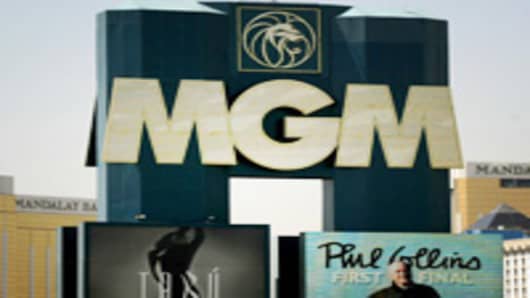“After playing defense for the first half of the year, we’re starting to play offense.”
That’s how a visibly relieved Jim Murren explained the outlook for MGM Mirage and its huge $8.4 billion investment with partner Dubai World in the CityCenter complex.
Dubbed by some “The Crown Jewel of the Las Vegas Strip”, CityCenter brought MGM Mirage to the brink of bankruptcy last spring as it appeared the company might not be able to complete financing. Dubai World threatened to withhold payments, and the unusual partnership between an Arab sovereign wealth fund and a western gaming giant faced its toughest test. MGM Mirage managed to renegotiate some debt and raise $2.5 billion, and the crisis passed. “Had I known we were going to get through this,” Murren says, “I probably would’ve enjoyed it more, because it was very intellectually challenging.”
Murren became Chairman and CEO last year after Terry Lanni resigned when the Wall Street Journal reported he’d padded his resume. It’s been quite a baptism by fire, but Murren believes MGM Mirage, and Las Vegas, have seen the worst of the recession. “We were sold out again last weekend,” he says of the Bellagio.
The company reported a $216 million loss last quarter, as sales fell 17 percent and casino revenue fell 12 percent. Murren said on the conference call that the situation appeared to be stabilizing, and he still thinks that. Room rates, which fell as much as 40 percent last winter, have been rising. “We’ve been able to get about half of that price back.” Still, analyst Anil Daswani at Citi has a Sell rating on the stock.
CityCenter will open in December, and at least 10,000 people will be hired to work in the complex of hotels, residences, casinos and retail stores.
Much of the focus is on the condos, where deposits on 70 percent of the units were made back when prices were high. The condos are no longer worth that much, and with the threat of buyers refusing to close at year’s end, CityCenter is finally preparing to lower prices for everyone. The new pricing plan will probably come out in October, along with a financing plan provided by MGM Mirage for buyers. “I think that’s going to lead to much greater closings than I think people anticipate right now.” Still he expects 25 percent of those who put down deposits to walk away.
While Murren says capital raising and debt restructuring last spring saved MGM Mirage from bankruptcy, the gaming giant is still planning to continue testing the debt and capital markets. Just last week it offered to swap $500 million debt maturing next year at 8.5 percent for debt maturing in 2016 at 10 percent. How’s that offer going? “Half the street says ‘Don’t do it’, the other half says it’s a pretty good deal,” Murren jokes, adding that he believes “The bond market’s gonna have a pretty good run after Labor Day.” Analyst Janet Brashear at Bernstein Research, who earlier this month upgraded the stock to Market Perform, called the move “Robbing Peter to Pay Paul”, but, “By our calculations, MGM is not in any danger of breaking its debt covenants in 2010, so this is not a desperation move of any sort.”




